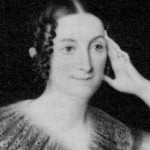Here in the West we have lost sight of the distinctive value and role of women. Is it time to differentiate again? Is it time once again to recognize the important differences between men and women?
“To what the singular prosperity and growing strength of that people [of the USA] ought mainly to be attributed, I should reply – to the superiority of their women.”
So wrote Alexis de Tocqueville (1805-1859), the French political thinker, social observer and historian. Tocqueville had spent a year traveling and observing American life in 1831. As a result of his travels, he wrote the classic Democracy in America (1835). Toward the end of the book, he writes that American women are superior to women found anywhere else in the world.
What raised American women above all others in the world? It was the understanding of female and male as complementary—equal and different. Isn’t it time to distinguish again between men and women, so that the people of the world can once again benefit from the unique contributions of women?
The American understanding, derived from the Trinitarian principle of unity and diversity, broke the grip of global sexism and elevated women to the position that is rightfully theirs by creation. The Creator established the woman as the equal counterpart of the man.
However, with the rise of the Darwinian metaphysic over the last century, America has witnessed the loss of transcendent sexuality—masculine and feminine. From that has followed the decline of the virtue of motherhood, the nurturing of children, and the formation of families.
 An entire vision of society has been lost and Western civilization itself is in a death spiral. All this because of the cultural celebration of “the death of God” and the abandonment of the biblical worldview.
An entire vision of society has been lost and Western civilization itself is in a death spiral. All this because of the cultural celebration of “the death of God” and the abandonment of the biblical worldview.
It is not enough to seek to return to a golden age of the past. We must return to first principles that shape our understanding of what it means to be human, to be female and male and form families.
To put it more bluntly, we need to return to reality.
What made American women so great?
There was a time when it was understood that the worth of men and women was intrinsic to their nature. Society affirmed that these two modalities, while different, are equal both in their being and in the value of their distinct natures.
Here is a longer version of Tocqueville’s thinking excerpted above. Some of what he says will sound foreign to modern ears. But this disharmony may cause us to reflect on our own understanding in light of the perspective of a previous generation.
Thus the Americans do not think that man and woman have either the duty or the right to perform the same offices, but they show an equal regard for both their respective parts; and though their lot is different, they consider both of them as beings of equal value. They do not give to the courage of woman the same form or the same direction as to that of man; but they never doubt her courage: and if they hold that man and his partner ought not always to exercise their intellect and understanding in the same manner, they at least believe the understanding of the one to be as sound as that of the other, and her intellect to be as clear. Thus, then, whilst they have allowed the social inferiority of woman to subsist, they have done all they could to raise her morally and intellectually to the level of man; and in this respect they appear to me to have excellently understood the true principle of democratic improvement. As for myself, I do not hesitate to avow that, although the women of the United States are confined within the narrow circle of domestic life, and their situation is in some respects one of extreme dependence, I have nowhere seen woman occupying a loftier position; and if I were asked, now that I am drawing to the close of this work, in which I have spoken of so many important things done by the Americans, to what the singular prosperity and growing strength of that people ought mainly to be attributed, I should reply – to the superiority of their women.
 Tocqueville, the Frenchman, was a keen observer of American life and the standards attained by American women. By the same token, his American contemporary, Lydia Sigourney (1791 – 1865) was an effective shaper of American life and culture through her life and work. Sigourney was a maternal feminist, poet, prolific writer and correspondent, hymnist, and social activist. (For more on Sigourney see What Today’s WOMEN (and Men) Owe to Lydia Sigourney.) Her book, Letters to Young Ladies, (1833) was one of the means by which Sigourney spoke into the American culture.
Tocqueville, the Frenchman, was a keen observer of American life and the standards attained by American women. By the same token, his American contemporary, Lydia Sigourney (1791 – 1865) was an effective shaper of American life and culture through her life and work. Sigourney was a maternal feminist, poet, prolific writer and correspondent, hymnist, and social activist. (For more on Sigourney see What Today’s WOMEN (and Men) Owe to Lydia Sigourney.) Her book, Letters to Young Ladies, (1833) was one of the means by which Sigourney spoke into the American culture.
In this brief series we will examine both of these authors to be reminded of what made American women so great.
For the sake of America’s future and for all who are concerned about the dignity of women we need to learn from some of the principles that shaped America’s understanding of women, men and families. My desire here is to comment on Tocqueville both from my own reflections and with excerpts from Sigourney’s Letters to Young Ladies.
… to be continued
- Darrow Miller





